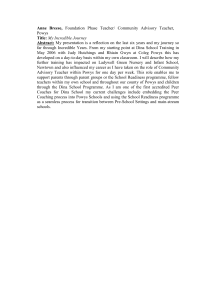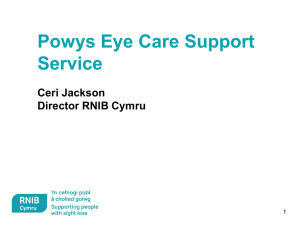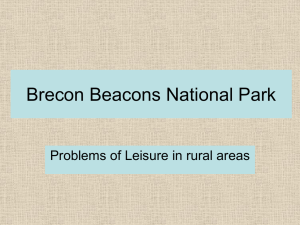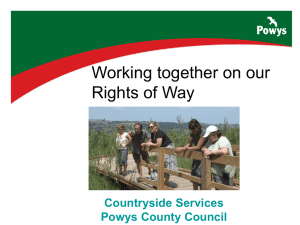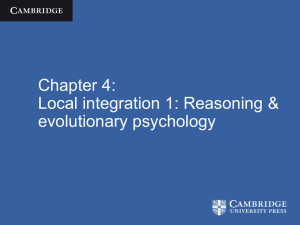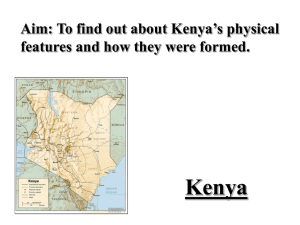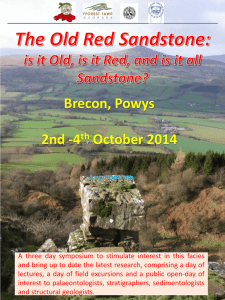Delivering appropriate education and training
advertisement
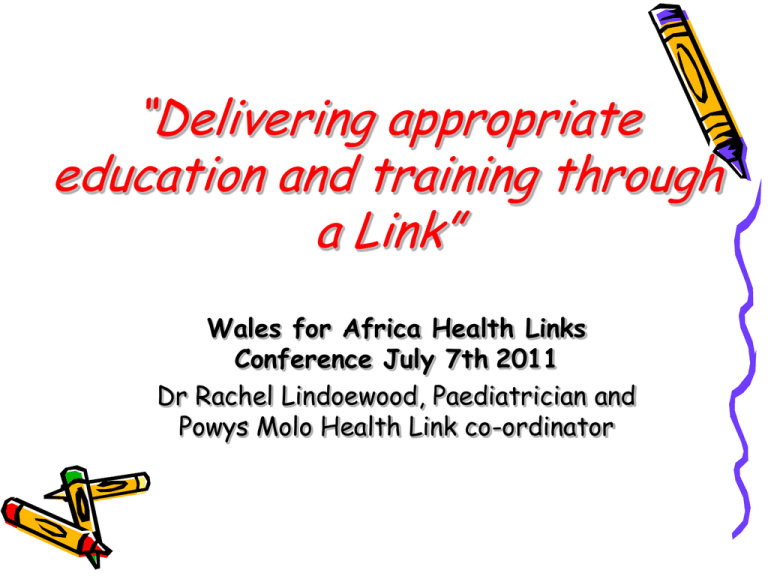
“Delivering appropriate education and training through a Link” Wales for Africa Health Links Conference July 7th 2011 Dr Rachel Lindoewood, Paediatrician and Powys Molo Health Link co-ordinator Biography • Paediatrician in Powys ,based in Brecon Children’s Centre • Powys Molo Health Link Co-ordinator • 9 years working clinically and managerially in a rural hospital in Eastern Kenya • Married to Paul (DWA), two children born in Kenya • Just completed specialist top up training • Interests in Childhood Disability&International Child Health Powys Molo (Kenya) Health Link Part of Brecon Molo Community Partnership Background of the Link - Part of Brecon Molo Community Partnership, one of six pilot partnerships under the Welsh Assembly Gold Star scheme in October 2007 - First team from Brecon visited Molo in October 2007 incl. physiotherapist who gathered health information and made key contact with District Physiotherapist -Molo badly affected by post election violence in Kenya so Molo Health link co-ordinator Dr Magdaline Itumbi not established until July 2008 Statistics • • • • • • • • PopulationArea Density Health Facilities- • Health Care Workers- • Molo, Njoro &Kuresoi Powys 500,000 4032km2 124/km2 District&2Subdistrict • • • • hospitals,6 Health centres,29dispensaries, Community Units 1 specialist,6Drs,15COs, RGN,SEN,CHWs, AHPs 132,000 5196 km2 24/km2 10 Community Hospitals, 30 GP Practices, Public health • 15 specialists, GPs,specialist RGNs, AHPs, PH staff POWYS MOLO HEALTH GROUPAIMS AND OBJECTIVES – To support Community Health Service development and Staff Continued Professional development in primary and secondary care settings within the 3 districts. – Of benefit to Powys Teaching Health Board in terms of building leadership skills, resourcefulness and better understanding of global health and development issues amongst its staff. – By end of 2012 ,we aim to have contributed to a reduction in Child and Maternal Mortality and morbidity in Molo, Njoro and Kuresoi districts in the Rift Valley Province of Kenya Key Principles For Training P artner requested and Locally delivered • • A ppropriate presentation style • R elevant, up to date content • T raining provided by or in close collaboration with local • N and/or national colleagues ational policies and programmes considered • E nd point- improve healthcare in line with MDGs and local service development. • R eflection, evaluation, and follow up. • S ustainable- training trainers, reasonable costs Example 1 – Public Health • Link started at same time as National “community strategy” reached Molo - help requested from Link. • Very similar to Ugandan Programme • Idea for South to South Link with Mbale (PONT link) • Exchange visits facilitated by Link (grant application completed in Molo 2009 visit) • Complementary to locally provided training -public health team inspired rather than daunted by Mbale teams policy into practice Example 1- Public Health, cont • More specific request for training in Monitoring and evaluation made during PH doctor visit to Powys in 2009 • Developed proposal and training pack • Co-trainer identified- Njoro District Public Health Officer • Training delivered October 2010 to 45 HWs,with one training day per district • Rolled out to 450 CHWs April 2011 Example 2- Maternal Health • Child Health Scoping visit Feb 2010 list of topics requested by Medical Officer in Charge included “Shoulder Dystocia”. • Powys Midwife sent training needs questionnaire-completed by staff ,used in course development • Local Co-trainer identified • Kenyan Obstetric Practice guidelines obtained and referred to Example 2 – Maternal Health, cont • Powys Midwife & Molo District Public Health Nurse • 2 day update course delivered October 2010, 30 frontline Health Workers • Request for further training. • • Evaluation comments demonstrated the thirst for knowledge and • learning and interest in practice in Wales Concern from Powys Midwife regarding overmedicalization of birth. Plans for exchange visits to address the previous 2 points Example 3- Child Health • Feb 2010 list of topics requested included “Club Foot” and “neonatal resuscitation” • Minimal impact on reducing Child Mortality in hospital & community • Separate ministries of health hampering service improvement – ( eg lack of supplies). Example 3- Child Health, cont. • Kenyan Paediatricians already developed evidence based Emergency Triage and Treatment + (ETAT+) course for District Hospitals –facility/district based • 5 day Course for 25 front line staff who treat sick children in the 3 districts -end 2011 • Lack of Child Health Champion to support ETAT+ implementation-VSO Paediatrician Sept 2011 • • Newborn Care training for CHWs 2012 Example 4-Cross sector/Multiagency • Scoping visit included visits to Government and NGO partners outside health-Schools, Children’s Home, Street Children Project, Vulnerable child community based support • Need for interagency collaboration for Child Protection identified • Safeguarding training – journey beginning Education - Other Examples • Broader than Training in scope / staff cadre • Hope to link Public Health “Healthy Schools” with “Child to Child” approach in collaboration with education links • TALC books/CDs in Health Facilities • Molo Link Co-ordinator committed to do Masters in Public Health without leaving her community- deferred 2 years but enrolling next week, distance learning LSHTM, mainly self funding - our role encouragement. Powys Molo Health Link Strengths • Link co-ordinator worked in another area of Kenya • Initiator and now Chairman of Community Link lived in Molo • Committed Molo based coordinator identified early on • Support from Health Board and Powys Public Health • Wales for Africa Network catalyst for south to south link, ETAT+ , VSO • Key Similarities of Weaknesses • Small Organisation spread over wide geographical area • Wide skill mix, few reserves • Powys staff current roles all community based • Risk of spreading ourselves too thinly and doing nothing well • Communications with Molo challenging-Technical difficulties and staff capacity • Change in Personal in Hosp. Any Questions?
